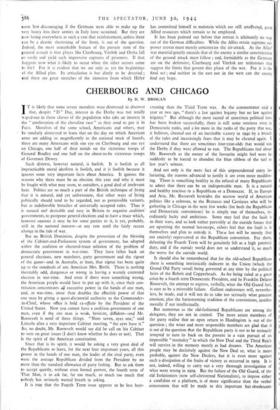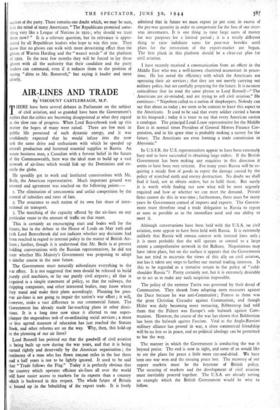CHERBOURG AND CHICAGO
By D. W. BROGAN
IT is likely that some severe moralists were distressed to discover that, despite " D " Day, interest in the Derby was not totally wiped-out in those classes of the population who take an interest in the " amelioration of the chevaline race" as they used to put it in Paris. Moralists of the same school, Americans and others, may be similarly distressed to learn that on the day on which American aims are adding so magnificently to the national stock of laurels, there are many Americans with one eye on Cherbourg and one eye on Chicago, one half of their minds on the victorious troops of General Bradley and one half on the about-to-be victorious troops of Governor Dewey.
Such distress, however natural, is foolish. It is foolish as all impracticable moral idealism is foolish, and it is foolish because it ignores some very important facts about America. It ignores the reasons why there must be an election this year and why it must be fought with what may seem, to outsiders, a good deal of irrelevant heat. Politics are so much a part of the British technique of living that it is natural, and yet unfortunate, that other ways of living politically should tend to be regarded, not as permissible variants, but as indefensible breaches of universally accepted rules. Thus it is natural and desirable and easy in Britain to organise coalition' governments, to postpone general elections and to have a truce which, however onerous it may be for some parties to it, is yet, probably, still in the national interest—at any rate until the fairly recent change in the tide of war.
But no British Dominion, despite the possession of the blessing of the Cabinet-and-Parliament system of government, has adopted either the coalition or electoral-truce solution of the problem of democratic government in war-time. They have fallen back on general elections, new mandates, party government and the rigour of the game—and in Australia, at least, that rigour has been quite up to the standards of any American Mrs. Battle. There is nothing inevitably odd, dangerous or wrong in having a warmly contested election in war-time. And even if there were something wrong, the American people would have to put up with it, since their con- stitution concentrates all executive power in the hands of one man, and, in war-time, more than doubles the effectiii power of that one man by giving a quasi dictatorial authority to the Commander- in-Chief, whose office is held ex-officio by the President of the United States. Now you cannot have a coalition government of one man, even if ths one man is weak, hesitant, diffident—and Mr. Roosevelt is nonE of these things. "Noes seven, ayes one," said Lincoln after a very important Cabinet meeting, " the ayes have it." So, no doubt, Mr. Roosevelt would say did he call on his Cabinet to vote on great issues (I don't know whether he does or not). That is the spirit of the American constitution.
Since that is its spirit, it would be asking a very great deal of the Republicans to leave, for the next four important years, all this power in the hands of one man, the leader of the rival party, even were the average Republican divided from the President by no more than the standard allowance of party feeling. But to ask them to accept quietly, without even formal protest, the fourth term of That Man, is to ask far, far too much, so much too much that nobody has seriously wasted breath in asking.
It is true that the Fourth Term issue appears to be less heat- creating than the Third Term was. As the commentator said a year or two ago, " there's a law against bigamy but no law against trigamy." But although the most sacred of unwritten political laws has been broken successfully, there is still some soreness even in Democratic ranks, and a lot more in the ranks of the party that was, it believes, cheated out of an inevitable victory in 1940 by a breach of the rules and increasingly fears that it may be cheated again. I understand that there are sometimes four-year-olds that would win the Derby if they were allowed to run. The Republicans feel about Mr. Roosevelt as the owner of the favourite might feel were he suddenly to be forced to abandon the blue ribbon of the turf to last year's winner.
And not only is the mere fact of this unprecedented entry in- furiating, the reasons advanced to justify it are even more madden- ing. There is something healthy in the refusal of many Republicans to admit that there can be an indispensable man. It is a natural and healthy reaction in a Republican or a Democrat. If, to Europe and Asia, Mr. Roosevelt bestrides the narrow world of American politics like a colossus, to the Brutuses and Cassiuses who will be gathering in Chicago in the next few weeks (for both the Republican and Democratic conventions) he is simply one of themselves, in- ordinately lucky and ambitious. Some may feel that the fault is in their stars, and so look rather peevishly at the outside forces that are upsetting the normal horoscope, others feel that the fault is in themselves and plan to remedy it. These last will be mostly (but not entirely) represented at the Republican convention. For them, defeating the Fourth Term will be genuinely felt as a high patriotic duty, and if the outside world does not so understand it, so much the worse for the outside world.
It should also be remembered that for the old-school Republican there is something intrinsically indecent in the Union (which the Grand Old Party saved) being governed at any time by the political heirs of the Rebels and Copperheads. As for being ruled at a great crisis by a fourth term Democratic President, and he Franklin Delano Roosevelt, the attempt to express, verbally, what the Old Guard feel, is sure to be a miserable failure. Gallant endeavours will, neverthe- less, be made, and it will not do to take too seriously what genuine emotion, plus the barnstorming tradition of the conventions, justifies morally if not intellectually.
But numerous as the old-fashioned Republicans are among the delegates, they are not in control. The more astute members of the party realise that an open return to Hardingism is out of the question ; the wiser and more responsible members are glad that it is out of the question that the Republican party is not to be seriously tempted to turn its back on the present in a vain pursuit of an impossible " normalcy " in which the New Deal and the Third Reich will survive in the memory merely as bad dreams. The American people may be decisively against the New Deal or, what is more probable, against the New Dealers, but it is even more against such a dissipation of the fruits of victory as occurred in 1919. It is not, indeed, willing to carry out a very thorough investigation of what went wrong in 1919. But the failure of the Old Guard, of the old Isolationists (now self-christened Nationalists), to impose either a candidate or a platform, is of more significance than the verbal concessions that will be made to this important but obsolescent section of the party. There remains one doubt which, we may be sure, is in the mind of many Americans." The Republicans promised some- thing very like a League of Nations in 1920 ; why should we trust them now? " It is a•relevant question, but its relevance is appre- ciated by all Republican leaders who hope to win this year. They know that no ghosts can walk with more devastating effect than the ghosts of Warren Harding and the " weasel words" of the platform of 1920. In the next few months they will be forced to lay those ghosts with all the authority that their candidate and the party leaders can command, even if it reduces them to the position of saving " ditto to Mr. Roosevelt," but saying it louder and more clearly.































 Previous page
Previous page